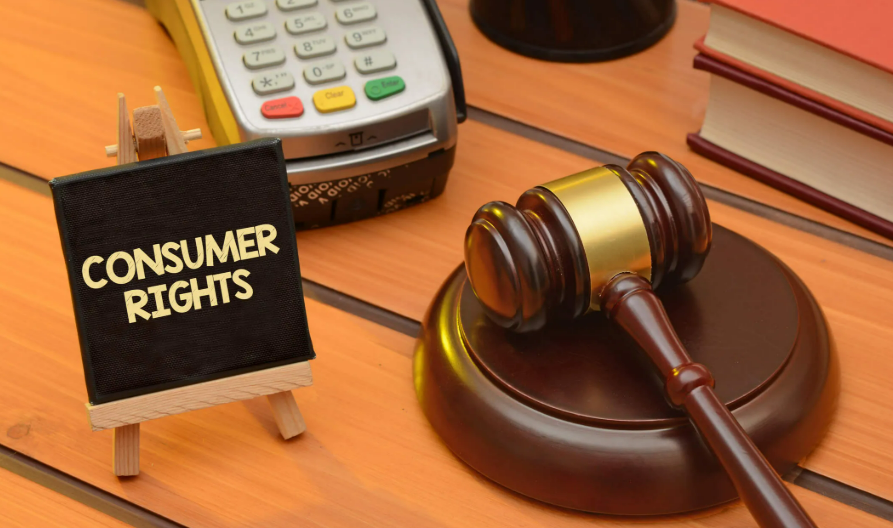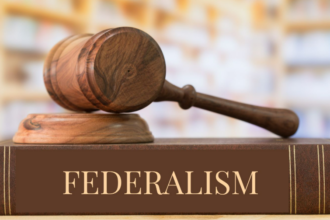In today’s competitive market, consumers face many challenges such as unfair prices, low-quality products, and misleading advertisements. To protect people from such exploitation, the idea of consumer rights was introduced.
Consumer rights ensure that every buyer is treated fairly, gets the correct information about goods and services, and is protected from unsafe or defective products. These consumer rights empower people to make informed choices and to raise their voice when they are cheated or misled.
The consumer movement played an important role in spreading awareness about consumer rights and led to the passing of the Consumer Protection Act (COPRA), which legally safeguards these consumer rights.
Thus, consumer rights form the foundation of a fair marketplace where consumers can buy with confidence, knowing that their interests are protected by law.
Introduction
Who is a Consumer?
- A consumer is a person who buys goods or services for personal use (not for resale or commercial purpose).
- Example: If you buy a pen for yourself — you are a consumer. But if you buy pens to sell in your shop — you are not.
Why Consumer Rights are Needed
- Consumers often face exploitation in the marketplace.
- Common problems:
- Adulteration (mixing harmful substances)
- Overcharging or false pricing
- Defective or low-quality goods
- False or misleading advertisements
- Lack of safety and after-sale service
Meaning of Consumer Rights
- Consumer Rights are the rights to be protected from unfair trade practices.
- These rights ensure that consumers:
- Get the right product
- At the right price
- With correct information
- And have a place to complain if wronged
Importance of Consumer Awareness
- Many consumers are unaware of their rights.
- Awareness helps consumers:
- Make informed choices
- Raise their voice against unfair trade
- Ensure accountability of producers
Government’s Role
- The Consumer Protection Act (COPRA) was passed in 1986, later updated in 2019.
- It gives legal power to protect consumer interests through consumer courts and redressal mechanisms.
Topic-1: The consumer in the marketplace
Consumer and the Marketplace
- The marketplace is where buyers (consumers) and sellers (producers/traders) meet to exchange goods and services.
- Ideally, both sides should have equal rights and complete information, but in reality, this rarely happens.
Consumer Exploitation
- Consumers often face unfair treatment in the market.
- Common forms of exploitation include:
- Overcharging – charging more than the printed price (MRP).
- Adulteration – mixing harmful or cheaper substances with goods (e.g., mixing water in milk).
- Underweight goods – giving less quantity than promised.
- False information or advertisement – misleading consumers about quality, safety, or uses.
- Defective products – selling low-quality or damaged goods.
- Lack of safety measures – unsafe electrical goods, toys, medicines, etc.
Why Consumers are Exploited
- Lack of consumer awareness about their rights.
- Limited information about products and laws.
- Sellers have more power and knowledge than buyers.
- Lack of proper redressal system or long legal process.
- Illiteracy and poverty among consumers.
Need for Consumer Protection
- To protect consumers from unfair trade practices.
- To ensure fair price, safety, and quality.
- To build trust between consumers and producers.
- To create awareness and encourage consumers to make informed choices.
Topic-2: Consumer Movement
Meaning of Consumer Movement
- The Consumer Movement is a social movement that began to protect consumers from exploitation and unfair trade practices in the market.
- It is an effort by people to create awareness, demand fair treatment, and ensure consumer rights are protected.
Why Consumer Movement Started
The movement began because of:
- Widespread exploitation – adulteration, overpricing, false claims.
- Lack of legal protection for consumers.
- Absence of consumer awareness.
- Unfair practices by traders and manufacturers.
- Negligence of government towards consumer issues in the early stages.
Early Efforts
- Initially, the movement was voluntary — started by consumer groups and non-government organizations (NGOs).
- They worked to educate people about their rights and responsibilities as consumers.
Important Milestone
- The Consumer Protection Act (COPRA) was passed in 1986 — a major step in strengthening the consumer movement in India.
- It provided consumers with legal rights and redressal mechanisms (consumer courts) to solve their complaints.
Role of Consumer Organizations
- Organize awareness campaigns and workshops.
- Help consumers file complaints in consumer courts.
- Promote honest advertising and ethical business practices.
- Celebrate World Consumer Rights Day on 15th March every year.
Topic-3: Consumer Rights
Meaning of Consumer Rights
- Consumer Rights are the legal and moral rights that protect consumers from unfair trade practices and exploitation.
- These rights help consumers make informed choices, ensure fair treatment, and allow them to seek redressal when wronged.
Six Rights of Consumers (as per COPRA)
- Right to Safety
- Protection from goods and services that are hazardous to health and life.
- Example: electrical goods, medicines, and food items must be safe for use.
- Right to be Informed
- Consumers must know all details about the product — ingredients, price, date of manufacture, expiry, quantity, etc.
- This helps prevent cheating through false advertisements.
- Right to Choose
- Consumers should have the freedom to select from a variety of products at fair prices.
- No one should force them to buy a particular brand or item.
- Right to be Heard
- Consumers’ interests must be considered in government policies and redressal forums.
- They can file complaints and expect fair hearing.
- Right to Seek Redressal
- Consumers have the right to compensation or replacement if they are cheated or harmed.
- Consumer courts (District, State, and National levels) help resolve complaints.
- Right to Consumer Education
- Consumers should be aware of their rights and duties.
- Education helps them make responsible decisions and avoid exploitation.
Importance of Consumer Rights
- Protects consumers from fraud and cheating.
- Promotes fair business practices.
- Builds trust between buyers and sellers.
- Encourages consumer awareness and participation in the economy.
Topic-4: ISI and Agmark
Meaning
- Quality certification marks are symbols that show a product meets specific standards of quality and safety.
- They help consumers identify reliable and standard products in the market.
ISI Mark
- Full form: Indian Standards Institute (now known as Bureau of Indian Standards – BIS).
- Used on: Electrical appliances, pressure cookers, cement, fans, switches, heaters, etc.
- Significance:
- Ensures the product is safe, reliable, and of good quality.
- Given by the Bureau of Indian Standards (BIS).
- A product without ISI mark may be unsafe or below standard.
Agmark
- Full form: Agricultural Marketing.
- Used on: Agricultural products like ghee, honey, pulses, grains, spices, and edible oils.
- Significance:
- Ensures product is pure, unadulterated, and meets set quality standards.
- Certified by the Directorate of Marketing and Inspection, Government of India.
Importance of ISI and Agmark
- Protect consumers from poor-quality or fake products.
- Build trust in branded goods.
- Help consumers make informed and safe choices.
- Encourage manufacturers to maintain high-quality standards.
Topic-5: Taking the consumer movement forward
Meaning
- The Consumer Movement can achieve its goal only when consumers actively participate in spreading awareness and asserting their rights.
- It is not only the duty of the government or consumer organizations but also of every citizen to take this movement forward.
Consumer Awareness
- Consumers must be aware of:
- Their rights and responsibilities.
- The laws that protect them.
- The procedures to file complaints in consumer courts.
- Awareness helps reduce exploitation and unfair trade practices.
Government Efforts
- The government spreads consumer awareness through:
- Jago Grahak Jago campaign (Wake Up Consumer).
- Setting up of consumer courts at district, state, and national levels.
- Establishment of Consumer Protection Councils.
- Making quality certification marks like ISI, Agmark, and Hallmark mandatory.
Role of Consumer Organizations
- Help consumers file complaints and get redressal.
- Organize seminars, workshops, and awareness drives.
- Publish magazines and articles about consumer issues.
- Act as a link between consumers, businesses, and government.
Role of Consumers
- Be aware and cautious while buying goods and services.
- Always check expiry date, price, and quality marks.
- Keep bills and documents as proof of purchase.
- Report unfair practices and file complaints when cheated.
- Encourage others to be responsible consumers.
Conclusion
The chapter highlights the importance of protecting consumers in a rapidly growing marketplace.
Consumers often face problems like unfair prices, poor quality, false advertisements, and lack of information.
To solve these issues, the Consumer Movement and the Consumer Protection Act (COPRA) were introduced to ensure justice and fairness.
Every consumer must be aware of their rights and responsibilities. Awareness is the key to preventing exploitation.
Government laws, consumer courts, and organizations play an important role, but the real strength of the movement lies in active and informed consumers.
In short, an aware consumer is the most powerful consumer — capable of bringing fairness, honesty, and accountability to the marketplace.
Detailed notes of other chapters:
Class-10th Economics Chapter-1 Development (NCERT Notes)
Sectors of Indian Economy: Class 10th Economics Chapter-2 ( Easy NCERT Notes )
Money And Credit: Class 10th Economics Chapter-3 ( Easy NCERT Notes )
Globalisation And Indian Economy: Class-10th Economics Chapter-4 ( Easy NCERT Notes )






